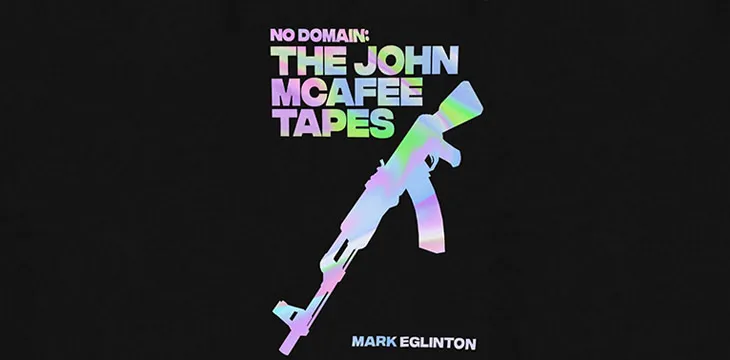|
Getting your Trinity Audio player ready...
|
Author Mark Eglinton and BSV publishing platform Canonic are looking to promote titles using NFTs. Their first example is Eglinton’s latest book “No Domain: The John McAfee Tapes“—a biographical look at McAfee taken from hours of taped interviews, promising “an exhilarating and uncensored account of the maverick tech titan’s wild life, a breakneck journey from Silicon Valley to his sudden, mysterious death in a Barcelona prison.”
Already on sale at multiple outlets, including Amazon, the book has been optioned to be turned into a documentary film by director Amanda Millius. By purchasing the NFT at Canonic, token holders will get a signed hardcover version of the book with holographic design, exclusive access to a Discord chat group where Eglinton and Millius will share updates and other McAfee-related stories, extra content from the making of the documentary, plus other as-yet-undecided perks.
Whether John McAfee himself was an anti-authoritarian hero, Bitcoin-scammer, or teller of tall tales (or all of the above) may depend on where you find yourself in the Bitcoin and blockchain world. Even those in McAfee’s circles were never quite sure, including Eglinton himself. However, whatever your take on McAfee’s character, his life before and after “crypto” was undoubtedly a wild ride, and its story makes a fascinating read.
Speaking to CoinGeek, Eglinton said he first entered McAfee’s world after the alt-tech guru contacted him about the possibility of writing a biography. Well known as a co-writer/ghostwriter on numerous such bios in the sports and (heavy metal) music fields, Eglinton decided it sounded worthwhile.
What followed was a wild ride in itself, thanks to McAfee’s eccentricities and famous aura of intrigue and paranoia.
“John described himself as the king of misinformation,” Eglinton said. But whatever the reality, “it doesn’t matter, because you’re never going to get to the heart of McAfee and the truth … there are grains of truth, and reality is somewhere in between.”
There were mysterious international trips, meetings with unnamed individuals who may or may not have been big-time Bitcoin players, odd requests and spy signals, laser-equipped buildings, and times when the deal almost fell through thanks to McAfee’s reluctance to use fiat currencies or bank accounts.
It all culminated in McAfee’s untimely death in June 2021, officially by suicide in a Spanish prison cell where he’d been held since his arrest on U.S. tax evasion charges almost a year previous. “By chance, (the book) became his last will and testament,” Eglinton mused.
McAfee was likely “feeling cornered in the end, and running on pure ideology” by the time of his arrest in Spain. He’d gotten himself out of plenty of sticky situations in the past against the odds but ultimately found one that got the better of him.
That is, “IF he’s even in the grave,” Eglinton added.
Movie and book together, tokenized
By now, many following from the Bitcoin (BSV) industry are probably more interested in putting McAfee’s story behind them and focusing on using blockchain technology to create value in the real economy. McAfee’s intrigue and overt nose-thumbing at governments struggling to retain control over digital finance represent Bitcoin’s past rather than its future.
Eglinton has his own issues with legacy industries and how they treat their talent. Though successful in the traditional publishing world, he said the system’s mechanics are definitely weighted against the author. Upon hearing of Canonic‘s blockchain-based publishing and payments model, he jumped at the chance to try something new.
“If I had any regrets, maybe we should’ve done it on Canonic exclusively … I will be looking at them definitely for all future works,” he said. “I could see it really shaking the industry up, and the industry does need shaking up.”
Eglinton is doing a double experiment with the Canonic/McAfee project. He’s seeing if blockchain publishing and payments can offer a realistic challenge to publishing and retail behemoths like Amazon.
Though vaguely familiar with Bitcoin in the past, he’d never actually become involved and can understand how outsiders often struggle to grasp its workings—not to mention the extra leap of having to acquire their first digital assets or really know what those assets even are.
He wanted his book’s NFT to be an experiment but also something with a genuine utility to it. “The definition I like is, it’s a digital receipt for something that exists in physical terms.” Those who convinced him described Bitcoin as “this is Metallica when they were playing club crowds in Los Angeles and San Francisco in 1982. We’re not at the stadium stage, we’re at the club band stage. We’re trying to get it to the stadiums.”
“I totally get that people make money from it (NFTs and digital assets) but this is actual work. This is proof of work, you’re doing something real,” Eglinton said.
Indeed, his book’s own token represents just that—the work of multiple people and parties. The token itself isn’t going to be traded or speculative. It’s a token, as those in BSV say they should be.
Whether or not Canonic has found the right marketing model remains to be seen. The NFT has sold 23 of a total of 218 so far, at $350 each. It may be that buyers will expect extra exclusive perks to go with their purchase, or different tiers of access should be something authors consider in the future. Eglinton admits there are aspects of Canonic’s model that some authors may find difficult, such as the lack of advance payments, the need to pay for printing costs (at least for physical editions), and how to be discoverable on a small-time platform compared to Amazon’s promotional machine.
Ultimately though, he said, it’s not about making a quick cash grab and more about wanting to steer technology in a positive direction. Eglinton said he simply wants a more free world for his son to grow up in, that governments’ approach to technology is too often “if we can’t stop it, we can control it. It was the general message of freedom I wanted to do.”
In that sense, the worlds of John McAfee and blockchain publishers like Canonic find common ground. Though their ways of achieving that freedom varies, and success is by no means guaranteed, freedom from control is something worth striving for. Each has their own way of chasing that goal.
Watch: CoinGeek New York panel, The New World of NFTs

 07-03-2025
07-03-2025 





